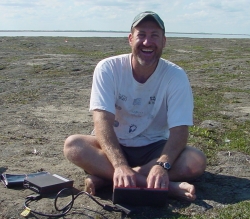
Howard (Howie) Epstein was elected to the ARCUS Board of Directors in 2013. His three-year term will end in 2016.
Howie is a Professor and Director of Graduate Studies in the Department of Environmental Sciences, as well as a co-Director of the College Science Scholars Program, at the University of Virginia. He received his PhD in Ecology from Colorado State University in 1997 and conducted postdoctoral research at the Institute of Arctic and Alpine Research (INSTAAR) at the University of Colorado Boulder. He took his current position at the University of Virginia in 1998.
Howie is an ecosystem and plant community ecologist, with a focus on vegetation-soil-atmosphere interactions and uses a combination of fieldwork, remote sensing, and simulation modeling in his research. He studies the recent dynamics of Arctic tundra vegetation in response to changing climate and disturbances, and the effects that these vegetation changes have on other Arctic ecosystem properties. His current Arctic-related projects include the development of an Alaska Vegetation Archive; as well as synthesizing vegetation, soil, and climate data across numerous tundra locations from North America and Russia. Since 2002 Howie has returned to the field nearly every year to visit tundra sites in northern Alaska, the Canadian Archipelago, and Siberia. In addition to his research in the Arctic, Howie works in temperate ecosystems of the U.S. Mid-Atlantic. In these systems he is examining vegetation dynamics, and carbon and nitrogen cycling, along successional gradients from old-field to old-growth, as well as carbon-water interactions in topographically complex watersheds. He is also presently working on a project to examine vegetation-climate-fire interactions in the Klamath Region of the Pacific Northwest.
Howie notes that "the changes that we have seen in the Arctic over the past several decades have already begun to elicit both positive and negative feedbacks in these systems, making observations of change and inferring mechanisms for these changes challenging prospects. ARCUS has a notable history of facilitating and synthesizing Arctic research, providing tangible benefits to the scientific process. ARCUS is poised to not only continue but to strengthen these efforts over the coming years. I am happy to be serving on the ARCUS Board during this exciting time that should see the expansion of ARCUS contributions from both disciplinary and geographic perspectives."
